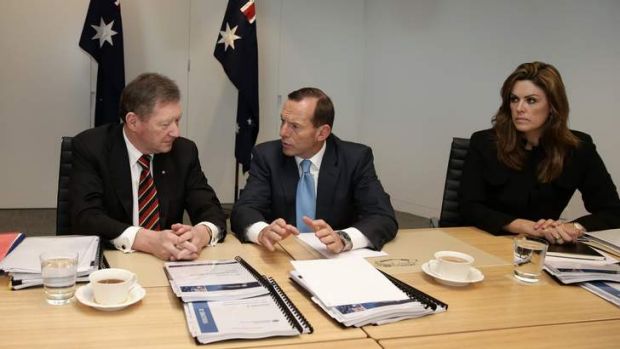It is often said that feminism has achieved its goals and is redundant in the twenty first century. Many young men and women alike believe that there is equality between the sexes and that women are treated equally to men and have the same life chances.
You only have to reflect upon the experiences of former Prime Minister Julia Gillard and former Chief of Staff to Tony Abbott, Peta Credlin to see that when it comes to women in power, this is far from the reality.
It is arguable that the tenure of Julia Gillard’s prime-ministership 2010-2013 was one of the most disgraceful and shameful periods in contemporary Australian politics. From the moment Gillard ascended to the top job, she was tarred with the brush of illegitimacy and accused of “knifing” Kevin Rudd.
Despite the fact that since federation Australian political parties have removed fourteen prime ministers, Gillard’s removal of Rudd was depicted as a Machiavellian moment par excellence. When Rudd finally removed Gillard after three failed attempts, there was barely a murmur of outrage. In fact, the silence was deafening. It was also in direct contrast to Turnbull taking out Abbott in 2015. Turnbull’s ascension was greeted with almost universal approval even though he essentially did what Gillard had done five years earlier.
Key sections of the media, ‘shock jocks’, sections of the general population, as well as an Opposition led by Abbott declared Gillard a “liar” over the pre-election promise not to price carbon, even though this was only ever part of a statement she made. In her full statement she did say the government would price carbon via an emissions trading scheme. But let’s not let the facts ruin the story, or the fact that Gillard did not have a majority government and needed the support of the Greens to pass important legislation.
When Peter Slipper took up the position of Speaker in the Lower House after Harry Jenkins resigned things went from bad to worse. Within a year, he was being accused of poor behaviour (that apparently was somehow a reflection on Gillard). Despite the fact that on 5 October 2012 the federal court had not made a decision on his case, Abbott demanded Gillard force Slipper to resign when parliament resumed the next week.
Of course, as she stated in her sexism and misogyny speech on 9 October 2012, the Parliament could not remove him as no judgment had yet been made in the federal court.
This didn’t stop the media branding Gillard a hypocrite despite the fact that she was simply adhering to the separation of powers as outlined in the constitution.
In short, no Prime Minister at that time would have been able to remove Slipper, yet the perception was that somehow Gillard was personally at fault and apparently lacked judgment. This was despite the fact that the Nationals had preselected Slipper for the 1984 and 1987 federal elections and the Liberals preselected him for the 1993, 1996, 1998, 2001, 2004, 2007 and 2010 federal elections (never once raising the question of Slipper’s character).
In another twist of misogynistic fate, Abbott’s removal as prime minister by Turnbull saw the blame laid squarely at the feet of his Chief of Staff Peta Credlin.
Credlin’s husband, Brian Loughnane made the point that “it is a good headline to say it is all her fault”[1]. Blaming Credlin for the demise of the Abbott government deflected a great deal of attention away from Turnbull removing a first time prime minister and Abbott’s own leadership style.
The Australian Women’s Weekly named Credlin Australia’s most powerful woman just one week after Abbott’s demise. Up until this point, Credlin had never spoken publicly about herself. In her speech she said that sexism was the most vexed issue for any woman in Australia who wanted to compete with men for power: “Half the policy in this country is for us, but only about a tenth is by us…if you don’t have women there, we will not exist”.
In the period between mid-October 2015 and early March 2016, four books were published that assessed the reasons for the failure of the Abbott government after only two years in power.
Without exception all of these books took a particularly personal view of why the Abbott government failed focussing on Abbott’s leadership style (leave it to Peta) and the role of Peta Credlin as his chief of staff.
In fact, the two books published in early 2016 by Patrick[2] and Savva[3] respectively specifically mention Credlin in the title.
Savva’s book is a case in point that sexism is not limited to men versus women, as women are often rather sexist to each other and this perpetuates the problem in a myriad of ways. Moreover, it could be argued that Credlin had a leading role in the depiction of Gillard as an illegitimate prime minister.
The treatment of Gillard and Credlin demonstrates that sexism is alive and well in contemporary Australia, irrespective of which side of politics is in government. Women in power are treated differently to men and are judged much more harshly. Their abilities are often trivialised and not recognised or appreciated. In fact, the better they are, the more abuse they are subjected to. The truth is both Gillard and Credlin are exceptional in their own way and both deserve credit where credit is due.
Notes
[1] Patrick, A. (2016). Credlin &Co: How the Abbott Government Destroyed Itself. Black Inc: Victoria.
[2] ibid
[3] Savva, N. (2016). The Road to Ruin: How Tony Abbott and Peta Credlin Destroyed Their Own Government. Scribe Publications: Victoria.




